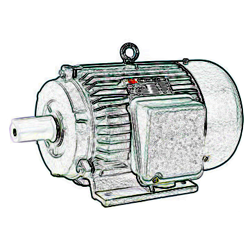Electrical Motors - Service Factors
Service factor - SF - is a measure of periodically overload capacity at which a motor can operate without beeing damaged.

The service factor - SF - is a measure of periodically overload capacity (Design Power) at which a motor can operate without damage. The NEMA (National Electrical Manufacturers Association) standard service factor for totally enclosed motors is 1.0.
A motor operating continuously at a service factor greater than 1 will have a reduced life expectancy compared to operating at at its rated nameplate horsepower.
NEMA Service Factor at Synchronous Speed (rpm) for drip proof motors:
| Motor Power (hp) | Service Factor - SF | |||
|---|---|---|---|---|
| Synchronous Speed (rpm) | ||||
| 3600 | 1800 | 1200 | 900 | |
| 1/6, 1/4, 1/3 | 1.35 | 1.35 | 1.35 | 1.35 |
| 1/2 | 1.25 | 1.25 | 1.25 | 1.25 |
| 3/4 | 1.25 | 1.25 | 1.15 | 1.15 |
| 1 | 1.25 | 1.15 | 1.15 | 1.15 |
| 1 1/2 and up | 1.115 | 1.15 | 1.15 | 1.15 |
Design Power vs. Motor Power and Service Factor can be expressed as
PD = SF P (1)
where
PD = design power (hp, W)
SF =service factor
P = motor power (hp, W)
Example - Design Power vs. Service Factor
A 1 HP motor with a Service Factor - SF= 1.15 can operate at
PD = (1 hp) 1.15
= 1.15 hp
without overheating or otherwise damaging the motor if rated voltage and frequency are supplied to the motor.
Insulation life and bearings life are reduced by the service factor load.



